Me and Earl and the Dying Girl
 Wow. I didn't intend to read this one tonight but I started and realized it was impossible to put down. There's so many ways this book could go wrong, but it manages to stay on the tracks (train metaphor!) without crashing into a mountain (plane metaphor!).
Wow. I didn't intend to read this one tonight but I started and realized it was impossible to put down. There's so many ways this book could go wrong, but it manages to stay on the tracks (train metaphor!) without crashing into a mountain (plane metaphor!). Basically, this book is HILARIOUS and gruff and a little frustrating (but in a way that makes sense and works when I sat back and considered things as a whole). The narrator is imperfect but witty; his friend Earl is phenomenal and smart; Rachel (the titular dying girl) is -- well, I can't say anything without destroying what Andrews has created here.
Suffice to say, I bought this book on a whim: GREAT cover + description that mentions filmmaking HS kids who watch Aguirre, The Wrath of God too much + great voice in the opening = winner.
I am not sorry I succumbed to the whim purchase. and now I will begin to champion this book.
Betting on the Muse: Poems and Stories
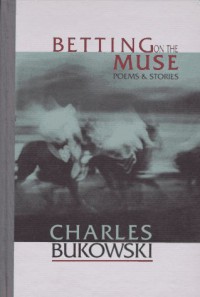 Excellent collection focusing more on old age and death. Not as much of the hilariously vulgar stuff like in LOVE IS A DOG FROM HELL. there are some GREAT poems in here. A good book to start with if new to Bukowski, though maybe not the BEST one to start with since it packs more of a punch to read about Bukowski's ideas of death after reading HAM ON RYE and some of the poetry from the 60s.
Excellent collection focusing more on old age and death. Not as much of the hilariously vulgar stuff like in LOVE IS A DOG FROM HELL. there are some GREAT poems in here. A good book to start with if new to Bukowski, though maybe not the BEST one to start with since it packs more of a punch to read about Bukowski's ideas of death after reading HAM ON RYE and some of the poetry from the 60s.
Boy21
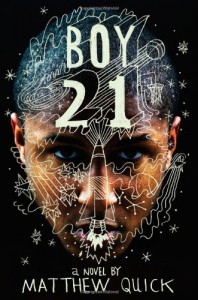 Matthew Quick's prior novels focus on damaged characters that end up relying on their network of friends and family to overcome emotional as well as practical problems. Be it his adult debut The Silver Linings Playbook: A Novel (soon to be a major motion picture directed by David O. Russell and starring Bradley Cooper) or his Young Adult debut Sorta Like a Rock Star, Quick crafts unique voices that carry readers through tribulations.
Matthew Quick's prior novels focus on damaged characters that end up relying on their network of friends and family to overcome emotional as well as practical problems. Be it his adult debut The Silver Linings Playbook: A Novel (soon to be a major motion picture directed by David O. Russell and starring Bradley Cooper) or his Young Adult debut Sorta Like a Rock Star, Quick crafts unique voices that carry readers through tribulations.It is important to understand this -- despite what you may believe you prefer in a good book (plot, romance, drama, humor) none of it matters if the VOICE doesn't work. If the narrator irritates you or lies to you or withholds information without reason, you may become frustrated. If you understand what the narrator cares about -- even if they keep secrets -- you will be engaged.
In Boy21, Quick continues his tradition of troubled characters with strong voices. A self-professed 'minimal speaker' (he literally responds with nods and gestures early on, but does speak), main character Finley is harboring a tragedy that occurred before the first page of the novel. He loses himself in the rituals of basketball and his loving, true relationship with Erin. We know from page one what and who he cares about, and it's one of the prime rules of fiction: show the reader what the character cares about and the reader will care, too.
Set in the fictional town of Belmont -- a blue collar Philly suburb populated by Irish and African Americans -- Finley has no sense of the possibilities of the world. Basketball, family, Erin -- these are the things that matter. Or, simply the things that exist and do not wound.
Quick then introduces the brilliant, fascinating titular character: Boy21. The setup involves Finley being asked to mentor Boy21 as he transitions from a well-to-do lifestyle in California after a tragedy of his own, but doing so risks Finley's basketball season and his relationship with Erin. Because Boy21 believes something crazy. About outer space. I can't give more away without truly ruining some of the first few scenes of Boy21's appearance in the novel -- but it is hilarious and nearly surreal.
To be clear: this is not a sports book. It's easy to say but needs to be stressed since reading about sports can be a dull experience for non-sports fans. As with The Silver Linings Playbook (where football dominates the main character's mind but not the plot), basketball here is part of the landscape and experience of the characters. It's important to them, but Quick isn't forcing us to read about 4 periods of HS basketball. I admire Quick's ability to describe sports in a way that makes fans and non-fans understand the true importance of the activities. It's not about whether Finley scores a winning shot or succeeds in practice. It's about Finley's need for a ritual to ensure he does not crumble beneath the stress of life, his town, and his tragedy.
The other strength in this and Quick's other novels is the spikes of humor. While not a comedy, plenty of images and dialogue exchanges had me laughing out loud. Like this: HA ha! or ha HA! or HAHA! While you are not asked to laugh at the mental health issues the characters suffer from, you are reminded through the humor that even the troubled, tragic people in this world exist on a day-to-day level. They can be depressed but smile; they can be sad but make a joke.
If you're already a fan of Quick's work -- even if you've only read Silver Linings -- this novel will definitely satisfy you. Adult readers have nothing to fear as there's a complexity to the structure of the novel that makes the book rewarding beyond the story (I mention this for people who might think Quick writes a simpler type of fiction for YA readers -- he doesn't.)
If you're new to Quick, you cannot go wrong by starting with Boy21 -- there's humor and truth and love and conversations that have to be re-read to be appreciated. I suspect lots of readers will start here and happily jump to Silver Linings or Sorta Like a Rock Star. Huzzah!
The Disenchantments
 I finished this book in February. It's April and I still think about it. I think that says enough, right?
I finished this book in February. It's April and I still think about it. I think that says enough, right? Well, here's a few more things to consider: there's a scene early in the book -- the band's first show in some dude's basement -- that had me smiling the whole way. Upon reading that scene, I knew that this was not going to be a slog through romantic angst or trauma or manufactured danger. This was going to be a quest for understanding and purpose (because the world is always demanding we "have a purpose"). It's a relationship story, yes, but not simply about Colby and Bev falling away from each other and then learning something. This is about all the most important kinds of relationships one can have -- with friends, family, strangers that become new friends, and strangers we see once and never again.
It's got some impressively real moments but what stands out most are the VISUALS LaCour conjures via language.
THE DISENCHANTMENTS is an excellent way to spend a weekend.
How to Live Safely in a Science Fictional Universe
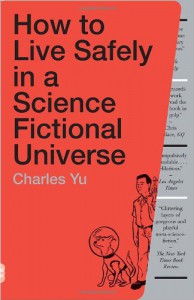 An excellent read that I imagine people will either love or be annoyed by. But, you'll know pretty quickly if that's the case for you. For me, this hit my sci-fi nerd-bones with just enough time travel stuff to satisfy without becoming overbearing. at it's core, this is a story about a son searching for his father in a convoluted time-stream. It's meta. It's got a lovable dog companion. It's got a great momentum (I read the last 120 pages in one sitting just to find out what happened and why it happened).
An excellent read that I imagine people will either love or be annoyed by. But, you'll know pretty quickly if that's the case for you. For me, this hit my sci-fi nerd-bones with just enough time travel stuff to satisfy without becoming overbearing. at it's core, this is a story about a son searching for his father in a convoluted time-stream. It's meta. It's got a lovable dog companion. It's got a great momentum (I read the last 120 pages in one sitting just to find out what happened and why it happened). Anyway, I could write a more profound review, but you should save that reading for this book and not my review.
A Good Man Is Hard to Find and Other Stories (Audio)
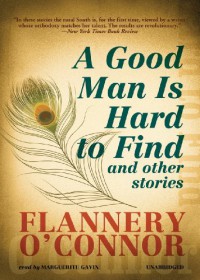 Wicked and weird. If you have some kind of religious handup, then this collection might either annoy or fascinate you. Basically, O'Connor loves to write about selfish people. And selfish people tend to get punished, but the part that makes this all work is O'Connor's DARK sense of humor. Check out the title story if you're unsure, then delight in other stories.
Wicked and weird. If you have some kind of religious handup, then this collection might either annoy or fascinate you. Basically, O'Connor loves to write about selfish people. And selfish people tend to get punished, but the part that makes this all work is O'Connor's DARK sense of humor. Check out the title story if you're unsure, then delight in other stories.
Simply from Scratch
 Alicia Bessette's debut marries a big social issue with an intimate story of mourning. From the opening page there's a sad edge to the humor found in Zell's narration that neatly highlights both the setting (a wintery Massachusetts's town) and the tenuous bonds between characters that once felt united forever. The relationship between Zell and Ingrid gives the story its best, most emotionally profound moments -- moreso than the romantic moments between Zell and Ingrid's determined but struggling single-dad. I assume Bessette understands that a novel about recovering from the loss of a husband one loves completely would be made trite by a storyline that revolved solely around a love interest. More importantly, though, this is not a book about one connection but many connections -- from the bonds of local townspeople to the unexpected links between people brought together through tragedies big (Katrina) and small (the death of a husband that everyone loved).
Alicia Bessette's debut marries a big social issue with an intimate story of mourning. From the opening page there's a sad edge to the humor found in Zell's narration that neatly highlights both the setting (a wintery Massachusetts's town) and the tenuous bonds between characters that once felt united forever. The relationship between Zell and Ingrid gives the story its best, most emotionally profound moments -- moreso than the romantic moments between Zell and Ingrid's determined but struggling single-dad. I assume Bessette understands that a novel about recovering from the loss of a husband one loves completely would be made trite by a storyline that revolved solely around a love interest. More importantly, though, this is not a book about one connection but many connections -- from the bonds of local townspeople to the unexpected links between people brought together through tragedies big (Katrina) and small (the death of a husband that everyone loved). I read this book in just two sittings, propelled forward by the voice and curiosity as to how things would work out (hoping it would not be a neat, overly sweet finish -- the kind I'm usually not satisfied by when there's a major social crisis involved). As it turns out, I was not disappointed, because Simply From Scratch, despite all the things fiction can 'get away' with, does not pretend to be about a perfect world with perfect people; instead it's a book with the invisible, difficult to vanquish villains of pain and loss. Ultimately, the Katrina backstory involving Zell's husband (whose death is directly related to his time in New Orleans) fits perfectly in terms of tone -- the details of the Katrina aftermath stand on their own and also work as a metaphor for Zell's own life disaster -- how she will have to save what she can from the rubble.
While this can be a difficult line to walk, Bessette doesn't leave the reader thinking that Katrina is a convenient contemporary issue that serves her characters. She avoids insulting the survivors of that real tragedy by celebrating survival and community in both storylines. It's a compelling use of the real life moment. In fact, I think the author would be more than capable of delving into Katrina more directly in a future book.
The Four Fingers of Death
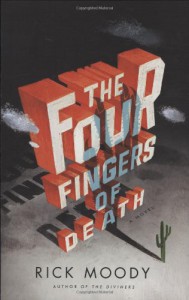 THE FOUR FINGERS OF DEATH will remind you that storytelling is supposed to be fun. It's supposed to stretch the imagination. It's supposed to make you laugh and cringe and cry and smirk and push yourself forward to find out what happens next.
THE FOUR FINGERS OF DEATH will remind you that storytelling is supposed to be fun. It's supposed to stretch the imagination. It's supposed to make you laugh and cringe and cry and smirk and push yourself forward to find out what happens next.Put simply, I have not had this much fun reading a book -- on nearly every page -- in a long, long time. The second half, especially, feels like a farcical look at contemporary America while the first half has the more gritty suggestion of life during wartime. Truly, this is a book about today and how we got here and what we think we're going as a nation that wants to be optimistic but does pessimistic things. but it's also just a crazy story about the desolation of space travel, paling booths, talking chimps, and a killer bacteria from Mars. And even with all the hilarious, quirky, imaginative chunks, there are some deeply emotional relationships -- some that are variations on the core love affair that helps initiate the whole novelization-within-a-novel plot.
It can be read deeply or not. It can be read slowly or not. But i cannot imagine someone failing to enjoy themselves! I cannot recommend this book enough and yet I hesitate, briefly, because I want everyone I talk to about this book to find it as bizarre and addictive as I do. it's not going to happen, of course, because we all have different needs and interests as readers.
Read it. Let it take its time. It will turn inside out, surprise you, impress you. And you won't have more fun reading anything else. ever.
The First Annual Grand Prairie Rabbit Festival
 A fantastic book about life in a really small town in Louisiana where a Catholic priest is having a bit of a crisis. It's not just the Altar girls (yes, girls), the inane confessions, the neighboring Pentecostal church being built -- it's the boredom! But this isn't a slow, dry, woe-is-me tale about a Priest. There's cursing, sexual tension, and legitimate exploration of the issues a priest faces when he realizes the noble possibilities of saving people's souls don't really pan out.
A fantastic book about life in a really small town in Louisiana where a Catholic priest is having a bit of a crisis. It's not just the Altar girls (yes, girls), the inane confessions, the neighboring Pentecostal church being built -- it's the boredom! But this isn't a slow, dry, woe-is-me tale about a Priest. There's cursing, sexual tension, and legitimate exploration of the issues a priest faces when he realizes the noble possibilities of saving people's souls don't really pan out. Wheaton's got a great sense of humor and isn't afraid to fill his world with morally torn people (both religious and otherwise). I highly recommend this book!
Personal Days
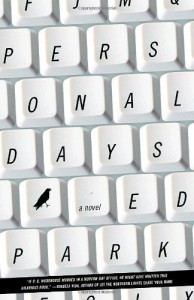 This is a fast-moving book that also requires patience. It DOES all come together in part 3 -- not because the first two sections are faulty, but because the reality of one of the characters ends up making a great statement about the world that the other characters drift through in parts 1 & 2. Ed Park has a great sense of control over his narrative, especially considering how easy it would be to jump all over the place infinitely, there is a clear movement from character to character here. Are all the anecdotes elaborate? no -- but I felt like even the little, seemingly innocuous anecdotes ended up contributing to the overall themes and characters.
This is a fast-moving book that also requires patience. It DOES all come together in part 3 -- not because the first two sections are faulty, but because the reality of one of the characters ends up making a great statement about the world that the other characters drift through in parts 1 & 2. Ed Park has a great sense of control over his narrative, especially considering how easy it would be to jump all over the place infinitely, there is a clear movement from character to character here. Are all the anecdotes elaborate? no -- but I felt like even the little, seemingly innocuous anecdotes ended up contributing to the overall themes and characters. Not sure everyone would love this or find it funny (I spent time in a company eerily similar, so lots seemed familiar), but I thought this was well done and look forward to his future work!
Sorta Like a Rock Star
 wow -- the kind of young adult book that transcends the genre (ie, you don't have to be a young adult to love this one). a fantastic first person voice, some hilarious scenes, emotional turmoil, and dozens of haiku. It all makes for a fast-paced but wonderful read.
wow -- the kind of young adult book that transcends the genre (ie, you don't have to be a young adult to love this one). a fantastic first person voice, some hilarious scenes, emotional turmoil, and dozens of haiku. It all makes for a fast-paced but wonderful read.The good news: you can pre-order on Amazon already! I just feel bad for those of you who will have to wait until May 2010 to read it!
The Silver Linings Playbook
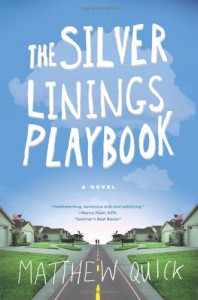 Matthew Quick's debut novel has a wonderful narrative voice that shares the almost unbelievably positive energy of the protagonist. Pat, our hero, has just been released from a mental hospital though he is not exactly sure how long he's been away. Pining for his wife, Niki, Pat aims to win her back by losing weight and being a better person (specifically, he tries to "be kind instead of right").
Matthew Quick's debut novel has a wonderful narrative voice that shares the almost unbelievably positive energy of the protagonist. Pat, our hero, has just been released from a mental hospital though he is not exactly sure how long he's been away. Pining for his wife, Niki, Pat aims to win her back by losing weight and being a better person (specifically, he tries to "be kind instead of right").The most amazing thing about Quick's novel is the pace. I found myself reading just "one more" chapter until I was at the end. The plot moves forward and yet the depth of Pat's character is clear and beautiful.
Much can be said about the role of football in the novel, but I can't say that non-football fans will be turned off. Quick's characters are die-hard Eagles fans, but Quick manages to render the tailgating scenes and football games (both live and televised) with a good sense of restraint. Which is to say, nothing sports-related in the novel should feel unnecessary to the non-Eagles fan. And Quick, despite being an Eagles fan, doesn't paint the fans with a wholly positive brush.
All in all, this was a bright, joyous novel that will please readers of all kinds. Get a copy today!
Grab On to Me Tightly as if I Knew the Way
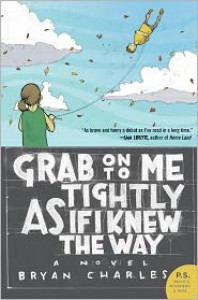 Fantastic example of what a coming-of-age novel can be. Avoids sentimentality and really moves forward thanks to Charles's ability to write really profound, wonderful sentences. Essentially the tale of a kid graduating HS in the early 90s. But it takes place in Michigan, so it has this great feeling of uniqueness. I never felt like Charles was writing a cliched story. Amazing how that can be accomplished with a setup that has been done to death.
Fantastic example of what a coming-of-age novel can be. Avoids sentimentality and really moves forward thanks to Charles's ability to write really profound, wonderful sentences. Essentially the tale of a kid graduating HS in the early 90s. But it takes place in Michigan, so it has this great feeling of uniqueness. I never felt like Charles was writing a cliched story. Amazing how that can be accomplished with a setup that has been done to death.
Chaucer
 A brief, precise analysis of crucial topics in Chaucer's work (class, religion, sex). There are places where some kind of limitation on page length has kept Aers from giving too many examples (he literally writes things like "there's no room here to discuss further examples"). Still, for a good, quick historicist & marxist look at Chaucer, Aers is the place to start.
A brief, precise analysis of crucial topics in Chaucer's work (class, religion, sex). There are places where some kind of limitation on page length has kept Aers from giving too many examples (he literally writes things like "there's no room here to discuss further examples"). Still, for a good, quick historicist & marxist look at Chaucer, Aers is the place to start.
How Fiction Works
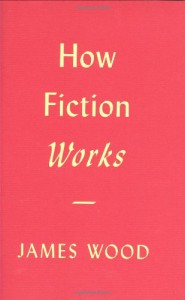 3.5 stars
3.5 starsWood's text begins with very clear explanations and examples, but eventually falls into a few messy areas involving point of view that I found less promising. Flaubert is his main source of inspiration, which may cause some people to gripe, seeing as a text like Madam Bovary might seem outdated in relation to contemporary literature. Still, the fact that Flaubert is used as a signpost for the "modern" novel gives Wood a clear line of critique and keeps the book somewhat focused. Still, I was disappointed that the clarity of the opening sections (the book is handy in that each salient point and example is given a numbered section) disappeared once Wood got deeper into his analysis.







